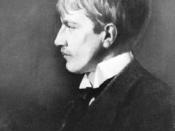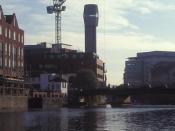Naturalist writers of short stories in the early 1900's often conclude their stories with a death or tragedy. Stephen Crane's "The Open Boat"� and Jack London's "To Build A Fire"� both follow this pattern by illustrating events leading up to and including death. More importantly, each author defines nature and it's bearing on his or her ideas of society, hierarchy, and morality.
Whereas each author has a different definition of nature, their ideas on other aspects of life run both parallel and perpendicular to one another. In Jack London's stories we find a very dramatic description of life, and on the other hand, Stephen Crane's description is quite cynical.
Through setting, plot, and characterization, London's "To Build A Fire"� gives the reader a dramatic description of life and conveys a message that humans need to be social in order to survive. London sets an average, middle-aged logger on a deserted Yukon trail during the wintry season where the temperature is seventy-five degrees below zero.
The logger, accompanied only by his husky, is traveling to a location ten miles away in order to meet his companions. The man is placed in this Yukon environment in order to symbolize that in this cold, cruel world one must learn to benefit from others.
Prior to embarking on his journey, the logger was advised from an old-timer at Sulfur Creek. He was told "no man must travel alone in the Klondike after fifty below."� The arrogant logger regarded this as "rather womanish"�, and assured himself that he was capable of making the trek alone. Not far in his travels, the character encounters death as he falls into a spring. "At a place where there were no signs, where the soft, unbroken snow seemed to advertise solidity beneath, the man broke...


